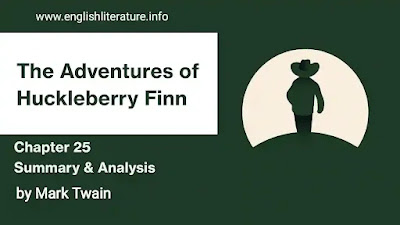Also Read
SUMMARY
The two frauds are given a warm welcome and they demonstrate their emotions most theatrically. Once they are through with all the weeping and histrionic display, the king gives a speech in which he thanks the townsfolk for their "dear sympathy and "holy tears" that has made their long journey worthwhile. 'To Huck, it is a "sickening" speech since he can see through all the farce. The King, then, invites the "Main principal friends" of the family to supper. He adds credibility to his masquerade by naming them- "Rev. Mr. Hobson, and Deacon Lot Hovey, ..., and their wives and widow Bartley. People believe them as he shows them that he knows each and every one by name due to the fact that his brother, the dead Peter Wilks, had written to him about them.
Following this, Joanne, one of the nieces, brings Peter Wilks' "Will". It tells them where he has kept the cash amounting to six thousand dollars. The swindlers find it four hundred and fifteen dollars short. They make up the "deffisit" by adding their own money into the pool.
The King says that he would like everyone to be present during the "funeral orgies" because his deceased brother liked and respected every single man in town. On hearing him speak in this manner, especially with the use of the word "orgies", the well-to-do and literate Dr. Robinson smells rat. Due to the former's malapropisms, he suspects the "brothers" to be imposters. When he raises his voice against them, he is driven away by the townsfolk who have iron faith in the undisputed legitimacy of the brothers. Nevertheless, the doctor is confident about and trusts his own judgment. He warns everyone of dire consequences, unless they wake up to reality.
CRITICAL ANALYSIS
Huck shows more empathy for the Wilks' daughters than he does for any other character in the novel. He feels empathy for the girls who have lost their uncle. This compassion steers him towards deeper moral grief that moves him terribly. He cannot see these innocent girls being swindled thus. They have, after all, been extremely kind towards him and kindness is something he values more than any thing else. Beyond his unsophisticated exterior, Huck reveals the fact that he is, in fact, more "Christian" than the older lot.
The Peter Wilks' episode is another incident that betrays the gulibility of the mob. How could they be so credulous so as to ignore the dismal lingo used by the King? His malapropisms, especially when he claims to be an Englishman", are unpardonable, when he talks of the "funeral orgies instead of the "obsequies". To top it all, he is unabashed and has the ga'l to say that "orgies", and not "obsequies" is a more appropriate word in the context. "Obsequies ain't used in England no more now - gone out. We say orgies now in England. Orgies is better, because means the thing you're after more exact. It's a word that's made up out'n the Greek orgo, outside, open, abroad; and the Hebrew jeesum, to plant, cover up; hence inter. So, you see, funeral orgies is an open er public funeral. The King's confidence and ability to convince is indeed commendable. The fact that the public gets taken in by all the "hogwash" and "sole-butter", and refuses to believe the decorous and trustworthy doctor, is indeed preposterous.
